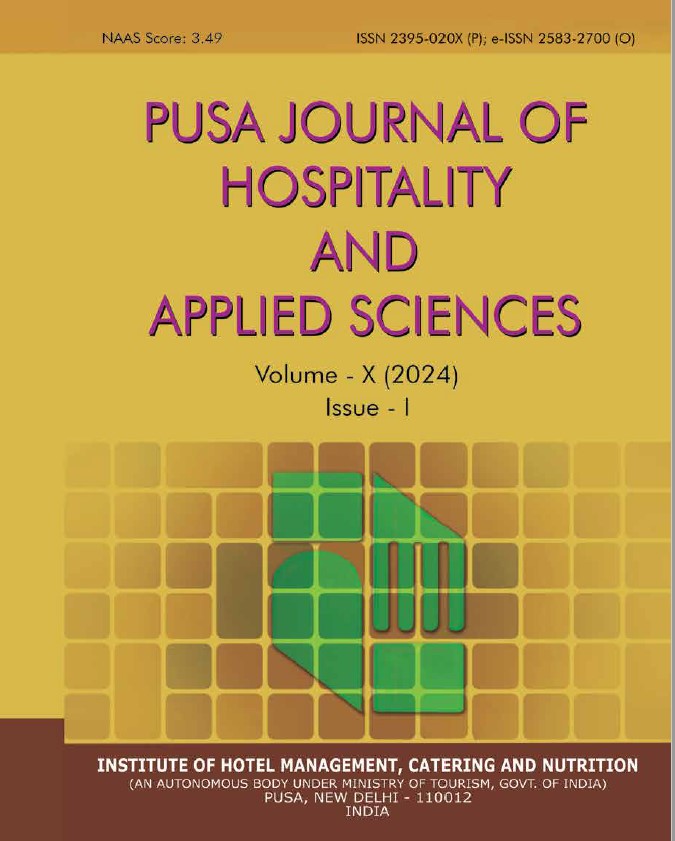Efficient Strategies For Managing Food Waste In Institutional Catering: A Comprehensive Study
DOI:
https://doi.org/10.48165/pjhas.2023.9.2.9Keywords:
Food waste, Institutional Catering, Environmental ImpactAbstract
Background: Food waste is a pressing global issue, and its management within institutional catering facilities is of paramount importance. Institutions such as College, hospitals, and corporate cafeterias generate substantial amounts of food waste, contributing to environmental concerns and economic inefficiencies. This abstract presents a comprehensive study aimed at identifying efficient strategies for handling food waste in institutional catering settings. Objectives: The primary objectives of this study were to Investigate the multifaceted impact of food waste management strategies in institutional catering and propose practical recommendations to enhance food waste management in these settings. Methodology: To achieve these objectives, a quantative -methods approach specifically descriptive research design was employed. Data was collected through online questionnaire through google form from few students who had explored few sets of institutional catering facilities. convenience sampling method was used for the data collection. Sample size was 194.Data were analysed using software spss 23 on the basis of Likert scale-based questionnaire. Results: The results of the one-sample tests indicate a significant difference (p < 0.001) in food waste generation between institutions implementing various food waste reduction strategies, with a mean difference of 2.98 (95% CI: 2.786 to 3.183). Additionally, there's a significant difference (p < 0.001) in the cost of food waste disposal between institutions employing waste reduction practices and those that do not, with a mean difference of 3.06 (95% CI: 2.868 to 3.256). The adoption of various approaches to cut down on food waste in institutional catering has shown a clear impact on the quantity of food waste generated. This discovery underscores the considerable potential of these strategies in decreasing the volume of food waste generated. Conclusion: Institutional catering can significantly reduce food waste through strategic implementation of waste reduction practices, menu planning, staff training, technology utilization, and customer engagement, resulting in cost savings, environmental benefits, and enhanced compliance and satisfaction.
References
Amicarelli, V., Aluculesei, A.-C., Lagioia, G., Pamfilie, R., & Bux, C. (2022). How to manage and minimize food waste in the hotel industry: an exploratory research. International Journal of Culture, Tourism and Hospitality Research, 16(1), 152–167. https://doi.
org/10.1108/IJCTHR-01-2021-0019
Anand, B. K., & Chaudhary, K. H. (2023). Exploring the relationship between corporate social responsibility (CSR) and sustainability and their transformative influence on social change. International Research Journal of Commerce , Arts and Science, 14(9), 154– 162. http://www.casirj.com/abstractview/17881
Dhir, A., Talwar, S., Kaur, P., & Malibari, A. (2020a). Food waste in hospitality and food services: A systematic literature review and framework development approach. Journal of Cleaner Production, 270, 122861. https://doi.
org/10.1016/j.jclepro.2020.122861
Dhir, A., Talwar, S., Kaur, P., & Malibari, A. (2020b). Food waste in hospitality and food services: A systematic literature review and framework development approach. Journal of Cleaner Production, 270, 122861. https://doi.
org/10.1016/j.jclepro.2020.122861
Elnakib, S. A., Quick, V., Mendez, M., Downs, S., Wackowski, O. A., & Robson, M. G. (2021). Food Waste in Schools: A Pre-/Post-test Study Design Examining the Impact of a Food Service Training Intervention to Reduce Food Waste. International Journal of Environmental Research and Public Health, 18(12), 6389. https://doi.
org/10.3390/ijerph18126389
Falasconi, L., Vittuari, M., Politano, A., & Segrè, A. (2015). Food Waste in School Catering: An Italian Case Study. Sustainability, 7(11), 14745–14760. https://doi. org/10.3390/su71114745
Filimonau, V., Matute, J., Kubal-Czerwińska, M., Krzesiwo, K., & Mika, M. (2020). The determinants of consumer engagement in restaurant food waste mitigation in Poland: An exploratory study. Journal of Cleaner 2023; 9(2) : 68-75
Production, 247, 119105. https://doi.org/10.1016/j. jclepro.2019.119105
Kattiyapornpong, U., Ditta-Apichai, M., & Chuntamara, C. (2023). Sustainable Food Waste Management Practices: Perspectives from Five-Star Hotels in Thailand. Sustainability, 15(13), 10213. https://doi.org/10.3390/
su151310213
Kumar, A., & Chaudhary, K. H. (2023). Empowering diversity: Role of artificial intelligence in Promoting Gender Inclusion within the Hotel Industry. Social,Economic and Gender Inclusiveness in Tourism and Hospitality Industry, 2–11.
Leal Filho, W., Ribeiro, P. C. C., Setti, A. F. F., Azam, F. M. S., Abubakar, I. R., Castillo-Apraiz, J., Tamayo, U., Özuyar, P. G., Frizzo, K., & Borsari, B. (2023). Toward food waste reduction at universities. Environment, Development and Sustainability. https://doi.org/10.1007/ s10668-023-03300-2
Malefors, C., Strid, I., & Eriksson, M. (2022). Food waste changes in the Swedish public catering sector in relation to global reduction targets. Resources, Conservation and Recycling, 185, 106463. https://doi.org/10.1016/j.
resconrec.2022.106463
Nikolicic, S., Kilibarda, M., Maslaric, M., Mircetic, D., & Bojic, S. (2021). Reducing Food Waste in the Retail Supply Chains by Improving Efficiency of Logistics Operations. Sustainability, 13(12), 6511. https://doi.
org/10.3390/su13126511
Oliveira, B., de Moura, A. P., & Cunha, L. M. (2016). Reducing Food Waste in the Food Service Sector as a Way to Promote Public Health and Environmental Sustainability (pp. 117–132). https://doi.org/10.1007/978-3-319- 24660-4_8
Parfitt, J., Barthel, M., & Macnaughton, S. (2010). Food waste within food supply chains: quantification and potential for change to 2050. Philosophical Transactions of the Royal Society B: Biological Sciences, 365(1554), 3065–3081. https://doi.org/10.1098/rstb.2010.0126
; 9(2) : 68-75
Paul, S., & Sharma, S. (2022). Employee Engagement In Organizations: A Study Done On The Operational Employees Of The 5-Star Hotels In Kolkata. PUSA Journal of Hospitality and Applied Sciences, 8(2), 24–
https://doi.org/10.48165/pjhas.2022.8.2.4
Schanes, K., Dobernig, K., & Gözet, B. (2018). Food waste matters - A systematic review of household food waste practices and their policy implications. Journal of Cleaner Production, 182, 978–991. https://doi.
org/10.1016/j.jclepro.2018.02.030
Shivapuri, A., & Misra, S. (2016). Food sustainability: An initiative of IHM Pusa. Pusa Journal of Hospitality and Applied Sciences, 2(1), 1-12.
Sonnino, R., & McWilliam, S. (2011). Food waste, catering practices and public procurement: A case study of hospital food systems in Wales. Food Policy, 36(6), 823–829. https://doi.org/10.1016/j.foodpol.2011.09.003
Thyberg, K. L., & Tonjes, D. J. (2016). Drivers of food waste and their implications for sustainable policy development. Resources, Conservation and Recycling, 106, 110–123.




